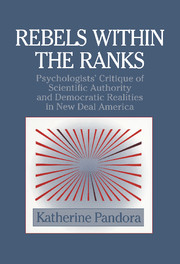 Rebels within the Ranks
Rebels within the Ranks Book contents
- Frontmatter
- Contents
- Acknowledgments
- Introduction
- 1 The Deep Context of Dissent: Jamesian Philosophy and Social Gospel Theology
- 2 Challenging the Rules of the Game
- 3 Defying the Law of Averages: Constructing a Science of Individuality
- 4 The Pursuit of “Impure” Science: Constructing a Science of Social Life
- 5 Natural History and Psychological Habitats
- 6 Exploratory Relativism and Patterns of Possibility
- Conclusions
- Notes
- Index
2 - Challenging the Rules of the Game
Published online by Cambridge University Press: 06 October 2009
- Frontmatter
- Contents
- Acknowledgments
- Introduction
- 1 The Deep Context of Dissent: Jamesian Philosophy and Social Gospel Theology
- 2 Challenging the Rules of the Game
- 3 Defying the Law of Averages: Constructing a Science of Individuality
- 4 The Pursuit of “Impure” Science: Constructing a Science of Social Life
- 5 Natural History and Psychological Habitats
- 6 Exploratory Relativism and Patterns of Possibility
- Conclusions
- Notes
- Index
Summary
The disturbing fact is that any persistent and searching inquiry into the criteria of psychology as science leads inevitably to a discussion of the essential principles of science itself … We cannot afford to forget the ideal of empirical science embodied in the words of Isaac Newton, “In this philosophy, propositions are based on phenomena, and laws are derived by induction.”
Arthur Bills (1938)By the close of the 1930s, arbiters of the status quo had begun to mount worried defenses of scientific method that sought to rebut what they saw as the pernicious effect of oppositional sensibilities such as those expressed by Allport and the Murphys. Defenders of right thinking such as psychologist Arthur Bills believed that the ground that had been “won by the efforts of Galileo, Bacon, Newton and others” was imperiled by “newer psychological systems which are clamoring for scientific status with all the vigor and scorn for tradition that characterize youthful movements.” C. C. Pratt, in his 1939 text, The Logic of Modern Psychology, defended the reigning orthodoxy, stating that science was “too serious and well established a game to be entered into lightly or altered, unless it can be shown either that a proposed alteration does not upset the essential features of play, or that the new game is better than the old one.” This is why those who “played” science had “a right to insist that it be played according to rule.”
- Type
- Chapter
- Information
- Rebels within the RanksPsychologists' Critique of Scientific Authority and Democratic Realities in New Deal America, pp. 35 - 60Publisher: Cambridge University PressPrint publication year: 1997
